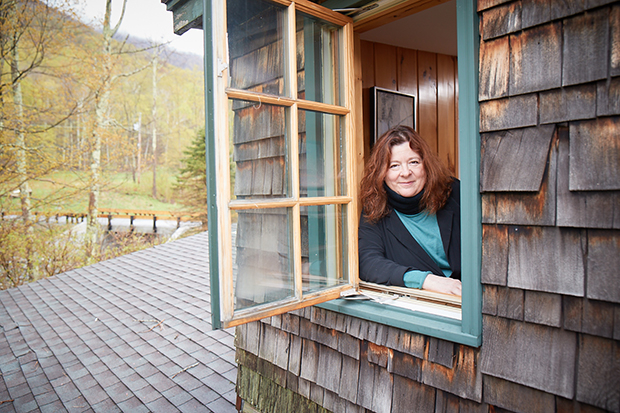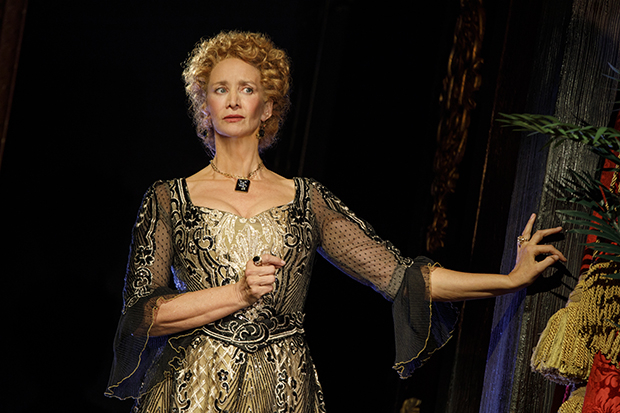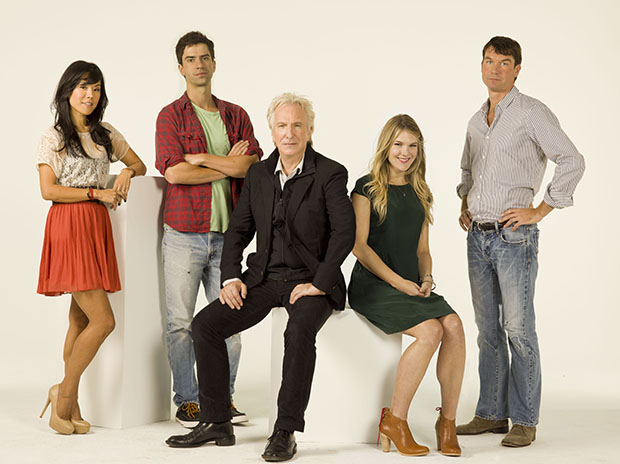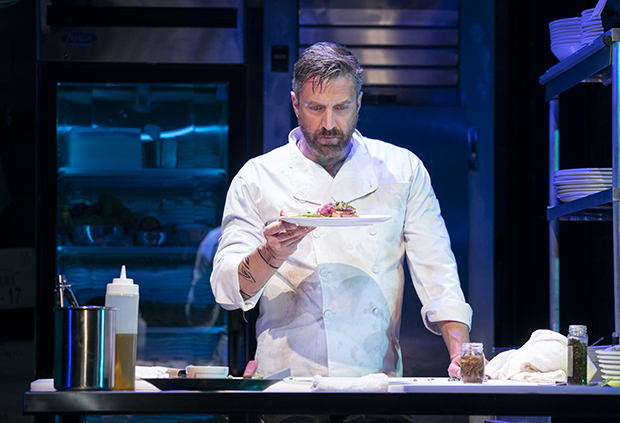Celebrating Her Newest Anthology, Theresa Rebeck Looks Back on a Remarkable Theatrical Period
The new book includes her latest work, ranging from ”Bernhardt/Hamlet” to ”Seared”.
The past few theater seasons have been prodigious for Theresa Rebeck. In 2018, New York saw the premieres of Downstairs, a thriller starring Tyne Daly and Tim Daly, as well as the world premiere of her Broadway drama Bernhardt/Hamlet, led by Janet McTeer as the legendary actor Sarah Bernhardt. In 2019, we saw Seared, a Raúl Esparza-led comedy about a hard-edged chef that, perhaps unbelievably considering she's had nearly 20 New York productions (including four on Broadway), netted Rebeck her very first career award to date: an Outer Critics Circle honor for Best New Off-Broadway Play (she was a Pulitzer finalist in 2004 for Omnium Gatherum).
This summer, Rebeck is reflecting on the experiences with the publication of her fifth anthology, Complete Plays, 2011-2019, from Smith & Kraus. In a live interview, and then later on the phone, Rebeck discussed the book, what it's like to work with acting superstars, and the ever-present stumbling blocks on the path for even established playwrights like her.

(© Bryce Boyer)
These interviews have been condensed and edited for clarity.
This is your fifth anthology with Smith & Kraus. How did you find them or vice versa?
Marisa Smith called me at a point when I thought my career was done. It was one of those periods that a lot of people go though, when I was like "That's that." She told me and said that they were going to put together an anthology of my plays and I was stunned. And every five or six years, she'd call me and say that it was time for another volume. At the time when they first came to me, I think they were the only American publisher that published anthologies of plays by living American writers. I don't know if that's still true. But it's quite lovely and I'm really grateful that they've taken on this project.
A couple of my favorite plays of yours are in this book — Seared, Bernhardt/Hamlet — and then there were a few that were new to me because they hadn't been done in New York City, like The Nest.
Just this year, people started doing The Nest, which I think is one of my best plays. It's set in a bar, and it kind of came out right when Sweat was coming out. And if you're gonna do a bar play, it's going to be Sweat. But it just got another production that was really wonderful, so I think people are gonna start doing it now. There's one in there, Fool, that I think is undersung. It hasn't had its moment, but I want to work on it and give it a major rewrite.
It seems like a no-brainer that Moritz von Stuelpnagel would write the introduction, since he's directed two of the plays in the volume.
He is the one for me. We've done three productions together and he's not just a genius, he's very, very funny and he's a really thoughtful gentleman. Over time, I've come to understand that that's what I need. I need people who behave themselves and who are gracious and keep the craziness out of the rehearsal hall. He's brilliant at that. He's the luck that fell on my head at this point in my career.

(© Joan Marcus)
I want to ask you what it's like to work with the caliber of actors you've had the opportunity to employ in your plays, like Alan Rickman in Seminar and Janet McTeer in Bernhardt/Hamlet.
I'm fully aware of the privilege and the honor. I had a moment during Bernhardt/Hamlet where I thought, "I'm the playwright who got to work with Alan Rickman on Broadway and now Janet McTeer on Broadway, and I don't know anyone else who got that deal." Janet McTeer is mighty. That was one of the biggest thrills of my entire career. It was a very exciting time for me.
Like many people, I had been obsessed with Alan Rickman for many years, and through very strange circumstances, I got to become friends with him. I learned a lot from him. He could be withering, he could be very, very challenging, but he had a beautiful heart. He became intrigued by Seminar and wanted to do it. I'm still catching up with the wonder of that sequence of events. You'd hang out with that cast, which also included Hamish Linklater and Hettienne Park and Jerry O'Connell and Lily Rabe, and think you were being with the cool kids. We'd go out and have drinks and laughs every night. It was a slightly alcoholic run. Alan loved martinis. He was a great influence in my life and I'm profoundly thankful to have known him. I miss him all the time.

(© Gavin Bond)
When you're writing a play, do you come at it from a specific angle of, say, "I'm gonna write about a tyrannical chef who refuses to make the same dish twice?" Or do you go in with a more abstract idea of "I'm gonna write about X topic."
You come at them from different directions. With Seared, which is what you're describing, I was thinking about art and the forces of creativity, and what happens when they meet capitalism. I love all my characters. I love Harry [the chef played by Raúl Esparza], but everybody was like, "He's a nightmare" and I'd say, "He's so charming!" The more I spent time with it, the more I said, "He's been allowed to run that kitchen like it's his own kingdom and he's ruling it in such a terrifying way." The more I worked on it, the more it became clear to me that the secret subject of the play was toxic masculinity and hierarchies.
What are the challenges that you still face as an artist, even though you're a more-than-established playwright?
Gender is still a real issue. I'm puzzled about why. There are so many really powerful male producers who don't seem interested in working with female playwrights. I've tried to talk to my male peers about it. [Playwright] Doug Wright, who's a great guy, said to me in a very passionate, honest discussion, "Why aren't female producers picking up the slack?" and I thought, "I don't want to hear what they think." I want to hear from David Stone and Scott Rudin and Jeffrey Richards. All those guys who've been around for a long time. What's the stumbling block? There are so many wonderful female theater artists, and if you just count who's doing what, the number of women working on Broadway is so much less than the men. That's a mystery to me, and we should be more concerned about it.
Are you working on anything now?
I am. I'm a writer! I don't have much else to do. I mean, I do, obviously. I have a lot on my mind and we live in a world where everyone has a lot on their mind. I have a play that's finished and ready to go that's gonna be at Arena Stage in DC, whenever we're ready to go back. It's called Enlightenment and it's about witchcraft and the Declaration of Independence. I'm writing a play about somebody stuck at home while his nightmarish father tortures everybody on the way to the grave. It's pretty funny. And I'm writing a novel about class issues and the children of privilege and the way the world disintegrates. I started it five years ago, and there's a part where there's a blackout in New York and within a day, the National Guard shows up and they're moving people off the street. Everybody who read pieces of it told me it seemed so weird.

(© Joan Marcus)







